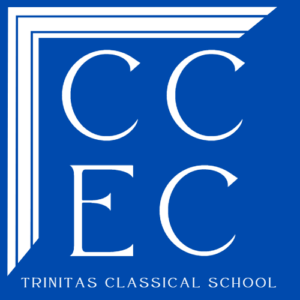We are delighted to welcome Alyse Garabelli as our new PSF Chair! Alyse has been enthusiastically serving the Trinitas community in a wide variety of ways (for which our staff is very grateful) since she and her family joined Trinitas.
Here’s a message from Alyse:
My husband, Mike, and I have two children at Trinitas: Dominic in first grade and Vincent in second. Outside the home, I have the great pleasure of working for Our Daily Bread University (part of Our Daily Bread Ministries). Apart from that, things that excite me are reading with my family, learning more about classical Christian education, and Detroit Lions football! Our family joined Trinitas two and a half years ago when Vincent started Kindergarten and we have been incredibly blessed by the community and friendships we’ve found here. I’m particularly grateful for how warm and welcoming the community has been, and that kind of welcome is something I’m motivated to share with others. I’m excited and thankful for this opportunity to serve as PSF Chair!

